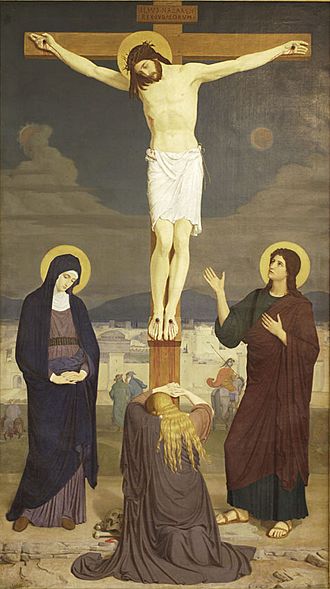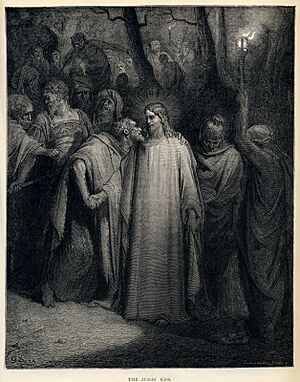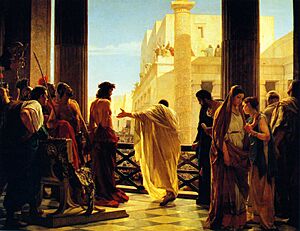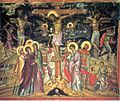Good Friday facts for kids
Quick facts for kids Good Friday |
|
|---|---|

A Stabat Mater depiction, 1868
|
|
| Type | Christian |
| Significance | Commemorates the crucifixion and death of Jesus Christ |
| Celebrations | Celebration of the Passion of the Lord |
| Observances | Worship services, prayer and vigil services, fasting, almsgiving |
| Date | The Friday immediately preceding Easter Sunday |
| 2025 date |
|
| 2026 date |
|
| 2027 date |
|
| 2028 date |
|
| Frequency | Annual |
| Related to | Passover, Christmas (which celebrates the birth of Jesus), Septuagesima, Quinquagesima, Shrove Tuesday, Ash Wednesday, Lent, Palm Sunday, Holy Wednesday, Maundy Thursday, and Holy Saturday which lead up to Easter, Easter Sunday (primarily), Divine Mercy Sunday, Ascension, Pentecost, Whit Monday, Trinity Sunday, Corpus Christi and Feast of the Sacred Heart which follow it. It is related to the Feast of the Exaltation of the Holy Cross, which focuses on the benefits, graces, and merits of the Cross, rather than Jesus's death. |
Good Friday is a special religious holiday for Christians. It is also known as Holy Friday or Great Friday. On this day, Christians remember the crucifixion (when Jesus was nailed to a cross) of Jesus Christ. They also remember his death and his rising from the dead. This holiday often happens at the same time as the Jewish holiday of Passover.
Many people believe Good Friday happened around the year AD 33. Some early ideas, like those from Isaac Newton, suggested it was AD 34. This was based on differences between the Bible's calendar and the Julian calendar.
Contents
The Story of Good Friday

The Bible tells us that Jesus was arrested in the Garden of Gethsemane. His own disciple, Judas Iscariot, helped the Temple Guards find him. Judas was paid 30 pieces of silver for this betrayal (Matthew 26:14-16). He showed the guards who Jesus was by kissing him.
Jesus was first taken to Annas, who was the father-in-law of the high priest, Caiaphas. After some questions, Jesus was sent to Caiaphas. There, the Sanhedrin, a group of Jewish leaders, had gathered (John 18:1-24).
Many people spoke against Jesus, but he stayed silent. Finally, the high priest asked Jesus if he was the Son of God. Jesus said yes. The high priest then accused Jesus of blasphemy (speaking disrespectfully about God). The Sanhedrin decided Jesus should die (Matthew 26:57-66). While this was happening, Peter, another disciple, denied knowing Jesus three times, just as Jesus had predicted.
Jesus Before Pilate
In the morning, Jesus was brought to the Roman governor, Pontius Pilate. The people accused Jesus of causing trouble and trying to stop people from paying taxes. They also said he wanted to be a king (Luke 23:1-2). Pilate questioned Jesus but found no reason to punish him.
When Pilate learned Jesus was from Galilee, he sent him to King Herod, who ruled Galilee and was in Jerusalem for Passover. Herod questioned Jesus, but Jesus did not answer. Herod sent Jesus back to Pilate. Pilate told the crowd that neither he nor Herod found Jesus guilty of anything. Pilate wanted to whip Jesus and then let him go (Luke 23:3-16).
It was a custom during Passover for the Romans to free one prisoner. Pilate asked the crowd whom they wanted freed. They chose Barabbas, a prisoner who had caused trouble. Pilate then asked what they wanted him to do with Jesus. The crowd shouted, "Crucify him!" (Mark 15:6-14). Pilate's wife had a dream and warned him to leave Jesus alone (Matthew 27:19).
Pilate had Jesus whipped. He tried again to release him. But the chief priests demanded Jesus be put to death because he claimed to be God's son. This scared Pilate. He brought Jesus back inside and asked where he came from (John 19:1-9).
Pilate then told the crowd one last time that Jesus was innocent. He washed his hands in water to show he was not responsible. But to keep the crowd from getting angry and to keep his job, Pilate handed Jesus over to be crucified (Matthew 27:24-26).
The Crucifixion and Burial
Jesus carried his cross to a place called Golgotha, also known as Calvary. There, he was crucified between two criminals (John 19:17-22).
Jesus was on the cross for six hours, suffering greatly. For the last three hours, darkness covered the whole land (Matthew 27:45; Mark 15:13; Luke 23:44). Finally, Jesus cried out, "It is finished," and died. An earthquake happened, tombs broke open, and the curtain in the Temple tore. A Roman soldier guarding the crucifixion said, "Truly this was God's Son!" (Matthew 27:45-54).
Joseph of Arimathea, a leader who secretly followed Jesus and disagreed with his death, asked Pilate for Jesus's body (Luke 23:50-52). Another secret follower, Nicodemus, brought spices to help prepare the body (John 19:39-40). Pilate made sure Jesus was dead (Mark 15:44). A soldier pierced Jesus's side, and blood and water flowed out (John 19:34).
Joseph of Arimathea wrapped Jesus's body in a clean linen cloth. He placed it in his own new tomb, which was carved into rock in a garden (Matthew 27:59-60). Nicodemus brought about 75 pounds of myrrh and aloes to place with the body, following Jewish burial customs (John 19:39-40). A large rock was rolled over the entrance of the tomb (Matthew 27:60). Then, they went home to rest because Shabbat (the Sabbath) began at sunset (Luke 23:54-56). The Bible says that on the third day, Sunday (now called Easter Sunday), Jesus rose from the dead.
How Good Friday is Celebrated
On Good Friday, special prayer services are held in churches. During these services, parts of the Gospels are read, telling the story of Jesus's crucifixion. Many Christian churches teach that Jesus chose to be crucified for everyone who believes in him. They believe that because of his crucifixion and his rising from the dead on the third day, death itself was defeated.
Related Pages
Images for kids
-
Antonio Ciseri's depiction of Ecce Homo with Jesus and Pontius Pilate, 19th century
-
Icon of the Crucifixion, 16th century, by Theophanes the Cretan (Stavronikita Monastery, Mount Athos)
-
Good Friday cross from the Catholicon at Holy Trinity Monastery, Meteora, Greece
-
Crucifix prepared for veneration
-
The Way of the Cross, celebrated at the Colosseum in Rome on Good Friday
-
El Greco's Jesus Carrying the Cross, 1580
-
The chancel of this Lutheran church is adorned with black paraments on Good Friday, the liturgical colour associated with Good Friday in the Lutheran Churches.
-
On Maundy Thursday, the altar of this Methodist church was stripped and the crucifix of this Methodist church has been veiled in black for Good Friday (black is the liturgical colour for Good Friday in the United Methodist Church). A wooden cross sits in front of the bare chancel for the veneration of the cross ceremony, which occurs during the United Methodist Good Friday liturgy.
-
The descent from the cross, commemorated in Vespers of Holy and Great Friday, Greek Orthodox Cathedral in Toronto
-
Nazarenos wearing capirotes, in Málaga, Spain
-
Hot cross buns are traditionally toasted and eaten on Good Friday in Britain, Canada, Australia and New Zealand.
See Also
 In Spanish: Viernes Santo para niños
In Spanish: Viernes Santo para niños
 | Chris Smalls |
 | Fred Hampton |
 | Ralph Abernathy |






















